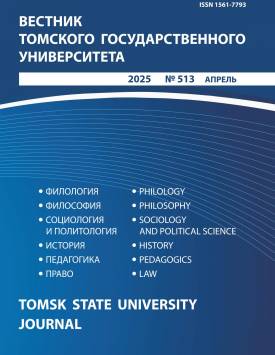Экологическое лидерство в международных отношениях: генезис и развитие концепции
Проводится обзор существующей научной литературы по теме экологического лидерства. Исследуются основные составляющие феномена экологического лидерства в мировой политике, рассматривается зарождение и развитие данной концепции. Приводятся различные точки зрения на определение понятия «экологическое лидерство». Автор заявляет об отсутствии конфликта интересов.
Ключевые слова
экологическое лидерство,
ЕС,
США,
экологическое управление,
теория международных режимовАвторы
| Можанов Вячеслав Сергеевич | Национальный исследовательский Томский государственный университет | аспирант кафедры мировой политики | slmozhanov@mail.ru |
Всего: 1
Ссылки
Schreurs M.A. Is Germany Really an Environmental Leader? // Current History. 2016. Vol. 115 (779). P. 114-116.
McKitrick R., Aliakbari E., Stedman A. Canada is an environmental leader, not a laggard // Fraser Institute. 2018. URL: https://www.fraserinstitute.org/artide/canada-is-an-environmental-leader-not-a-laggard (дата обращения: 06.03.2025).
Bodansky D. The Copenhagen Climate Change Conference: A Postmortem // American Journal of International Law. 2017. Vol. 104 (2). URL: https://www.cambridge.org/core/journals/american-journal-of-internationallaw/article/abs/copenhagen-climate-change-conference-apostmortem/04A9AD2A440C507DBB834DB5D7091AD8 (дата обращения: 06.03.2025).
Dimitrov R.S. Inside UN Climate Change Negotiations: The Copenhagen Conference // Review of policy research. 2010. Vol. 27 (6).
Depledge J. The Organization of Global Negotiations: Constructing the Climate Change Regime. London: Routledge, 2016. 272 p.
Breitmeier H., Young O.R., Zurn M. Analyzing international environmental regimes: from case study to database. London: The MIT Press, 2006. 323 p.
Krasner S.D. Structural Causes and Regime Consequences: Regimes as Intervening Variables // International Organization. 1982. Vol. 36, № 2. P. 185-205.
Vogler J. Taking Institutions Seriously: How Regime Analysis can be Relevant to Multilevel Environmental Governance // Global Environmental Politics. 2003. Vol. 3 (2). P. 25-39.
Young O.R. Political leadership and regime formation: On the development of institutions in international society // International Organization. 1991. Vol. 45 (3). P. 281-309.
Underdal A. Leadership theory: Rediscovering the arts of management // International multilateral negotiation: Approaches to the management of complexity. San Francisco, CA: Jossey-Bass, 1994. P. 178-197.
Malnes R. ‘Leader' and ‘Entrepreneur' in International Negotiations: A Conceptual Analysis // European Journal of International Relations. 1995. Vol. 1, Is. 1. P. 87-112.
Parker C.F., Karlsson C. Leadership and International Cooperation // The Oxford Handbook of Political Leadership. Croydon: Oxford University Press, 2014. P. 580-594.
Vogler J. The European Contribution to Global Environmental Governance // International Affairs (Royal Institute of International Affairs). 2005. Vol. 81 (4). P. 836-848.
Zito A.R. The European Union as an environmental leader in a global environment // Globalizations. 2005. Vol. 2, Is. 3. P. 363-375.
Torney D. European Climate Leadership in Question: Policies Toward China and India. Cambridge: The MIT Press, 2015. 285 p.
Ivanova M., Esty D.C. Reclaiming U.S. Leadership in Global Environmental Governance // The SAIS Review of International Affairs. 2008. Vol. 28, № 2. P. 57-75.
Sussman G. The USA and Global Environmental Policy: Domestic Constraints on Effective Leadership // International Political Science Review. 2005. Vol. 25, № 4. P. 349-369.
Young O.R.International Governance: Protecting the Environment in a Stateless Society. Ithaca: Cornell University Press, 1994. 240 p.
Mitchell R.B.International Environmental Politics // Handbook of International Relations. London: Sage, 2003. P. 801-826.
Nye J.S. The Powers to Lead. New York: Oxford University Press, 2008. 240 p.
Falkner R. Regulating Biotech Trade: The Cartagena Protocol on Biosafety // International Affairs. 2000. Vol. 76 (2). P. 299-313.
Falkner R. American Hegemony and the Global Environment // International Studies Review. 2005. Vol. 7, № 4. P. 585-599.
Porter G., Brown J.W. Global Environmental Politics. 2nd edition. Boulder: Westview Press, 1996. 256 p.
Oberthur S., Kelly C.R. EU Leadership in International Climate Policy: Achievements and Challenges // The International Spectator. 2008. Vol. 43, Is. 3. P. 35-50.
Falkner R. The political economy of ‘normative power' Europe: EU environmental leadership in international biotechnology regulation // Journal of European Public Policy. 2007. Vol. 14 (4). P. 507-526.
Karlsson C., Parker C., Hjerpe M., Linner B. Looking for Leaders: Perceptions of Climate Change Leadership among Climate Change Negotiation Participants // Global Environmental Politics. 2011. Vol. 11 (1). P. 89-107.
Buzan B. China and Climate Change Governance: A Golden Opportunity // China Quarterly of International Strategic Studies. 2021. Vol. 7, Is. 1. P. 1-12.
Шаклеина T. Лидерство и современный мировой порядок // Международные процессы. 2015. Т. 13, № 4 (43). С. 6-19.
Baker A. Ukraine's Conflict Has Rippled All the Way to the Arctic Circle // TIME. March 9, 2022. URL: https://time.com/6156189/russia-ukraine-conflict-risks-arctic-climate/(дата обращения: 25.07.2023).
Шуленина Н.В. Экологическая политика современной России: от императивов к аргументам // Вестник РУДН. Серия: Политология. 2003. № 4. С. 43-54.


 Вы можете добавить статью
Вы можете добавить статью